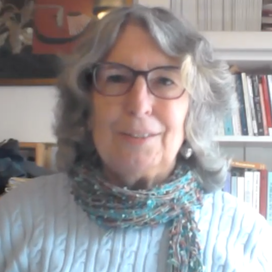Deborah, what motivates you to be a mentor? I did community college teaching for quite a few years and what I liked best was getting to know the individual students. But the opportunity after I retired to be a mentor with high school students was really appealing to me because I wanted to get to know those students and I wanted to keep helping, but without the pressure of preparing material and teaching it. So I really wanted to get to know them. I live in Oakland and I really care about Oakland and I care about the kids here, so this is something that’s very close to my heart. You started out working with individual students and then did classroom mentoring. Can you say something about the difference between those and how you go out that differently? I started out during the pandemic, so the very first student I worked with was completely online. I had another student that I was meeting with individually at appointments outside her classroom. Then I had another one I was going to meet with and sit with in class. All these were very different. It was particularly difficult having separate appointments and students don’t want to show up. If I’m working with just one student, they just might be in school that one day. It’s a lot easier with a classroom where I can get to know a number of students, which I enjoy. I assist in mentoring for CAR [Central Academic Recovery program for OUSD students who have not passed their classes the first time]. The teachers are specifically focused on this with them, so I feel like I’m working most closely with the teachers that way. Can you give us an idea of what a typical session is like in one of these CAR classes? As students are working on their own or maybe in pairs or small groups, I’m walking around the classroom being friendly. Part of this is taking time for the students to get to know me and trust me–that I might be helpful to them and that I’m a friend to them. I also look around for students who aren’t actively involved in the assignment and approach them in a gentle way. For example, I might stand by them for a little while and I may ask them if they want help. But I can see if I can help them on something they’ve already started doing. If they’re looking at part of the assignment and maybe they don’t really understand what’s being asked, so I can ask them to explain to me what they’re doing. If they haven’t even gotten started yet, I can gently encourage them to pull up the assignment on their laptop or get out the worksheet and start looking at it and tell me about the assignment. Do you want to say anything about what it’s like because these students get to know you? It makes a huge difference! They’re used to having me around. If I haven’t helped them yet, they’ve seen me work with other students. It really helps to build trust and I find I can be more helpful as the semester goes on. You work with a lot of students who are English Language Learners. What is that in terms of a challenge for them and a challenge for you? Well obviously it’s a big challenge for them. The teachers empathize and are aware of it. If I’m working with a student and I notice words that I think would be difficult to know, I ask them if they understand them. This way, I can help define them or help the student find the definition. Sometimes I help to translate whatever it is into colloquial English. I do know a little Spanish. Depending on the student’s personality, sometimes it becomes an ongoing interaction where they’re teaching me and I’m teaching them. Do you want to speak on something that you’re proud of or what keeps you mentoring? Like I mentioned in the beginning, I really enjoy getting to know the students. I care about them. I really wish them the best. It feels great seeing them achieve, to point it out to them, even though they don’t always acknowledge it. But I try to point out how well they’re doing. I can congratulate them. Liked the interview? Leave a comment below or forward this to a friend. Apply to be a mentor yourself!
0 Comments
Leave a Reply. |
|
|
© 2023 Oakland Serves


 RSS Feed
RSS Feed